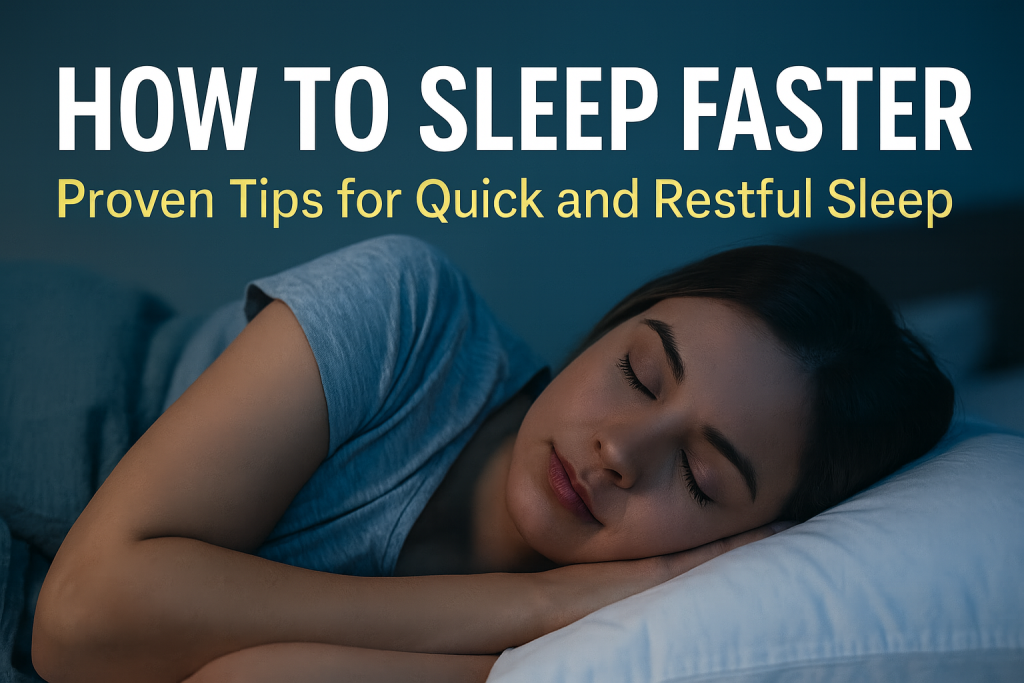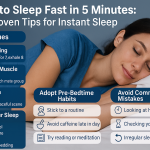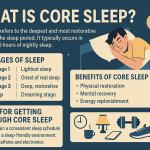How to Sleep Faster: Proven Tips for Quick and Restful Sleep
If you’re tired of tossing and turning, longing for the moment you finally drift off to sleep, you’re not alone. Millions struggle with falling asleep quickly, yet restful sleep is essential for our mental, emotional, and physical health. Fortunately, by understanding how to sleep faster and implementing a few strategic techniques, you can fall asleep quickly and enjoy deeper, more restorative sleep.
Why Is It Hard to Fall Asleep?
Many factors can interfere with your ability to fall asleep fast. Common culprits include:
- Stress and anxiety: Racing thoughts or worries can keep your mind active at night.
- Poor sleep hygiene: Irregular sleep schedules or using electronic devices before bed disrupt your body’s natural sleep rhythm.
- Environmental factors: Noise, light, or uncomfortable bedding can make it difficult to relax.
- Lifestyle choices: Consumption of caffeine, alcohol, or heavy meals close to bedtime affects your body’s readiness for sleep.
- Medical conditions: Disorders like insomnia, sleep apnea, or restless leg syndrome can prolong the time it takes to fall asleep.
Understanding and addressing these factors is the first step toward learning how to sleep faster each night.
How to Sleep Faster: Science-Backed Strategies
There’s no magic trick for instant sleep, but these tried-and-true strategies can help you fall asleep in less time and wake up feeling rejuvenated.
1. Set a Consistent Sleep Schedule
Your body thrives on routine. Going to bed and waking up at the same time every day (even weekends) helps regulate your circadian rhythm, making it easier to fall asleep quickly. Avoid sleeping in or staying up late, as inconsistency confuses your internal clock.
2. Create the Perfect Sleep Environment
Your bedroom should be a sanctuary for sleep. Optimize your environment by:
- Reducing light: Use blackout curtains or a sleep mask to block outside light.
- Lowering noise: Use earplugs or a white noise machine to mask disruptive sounds.
- Controlling temperature: Keep your room cool (around 60-67°F or 15-19°C).
- Choosing comfortable bedding: Invest in a supportive mattress and cozy pillows.
3. Limit Exposure to Screens Before Bed
Electronic devices emit blue light, which can suppress melatonin production—the hormone that signals your body it’s time to sleep. Aim to put away phones, tablets, and computers at least 30-60 minutes before bedtime. If you must use devices, consider blue light blocking glasses or night mode settings.
4. Practice Relaxation Techniques
Relaxation practices calm your mind and body, making it easier to sleep faster. Try these techniques:
- Deep breathing: Focus on taking slow, deep breaths to reduce heart rate and anxiety.
- Progressive muscle relaxation: Tense and release each muscle group, starting from your toes and working up.
- Visualization: Imagine a peaceful setting, such as a beach or forest, to distract from stressful thoughts.
- Meditation or mindfulness: Guided meditations can help clear your mind and prepare for sleep.
5. Watch Your Diet and Beverages
What you eat and drink before bed impacts how quickly you fall asleep. Avoid caffeine and nicotine in the afternoon and evening, as they are stimulants. Steer clear of heavy or spicy meals close to bedtime, which can cause discomfort or indigestion. Instead, opt for a light snack if you’re hungry—a banana or a small bowl of oatmeal can promote sleep thanks to their tryptophan content.
6. Get Moving—But Not Too Late
Regular exercise supports better sleep, but timing matters. Aim for at least 30 minutes of moderate activity most days, but try to finish workouts at least 2-3 hours before bedtime. Exercising too close to bedtime can raise your body temperature and make it harder to fall asleep.
7. Manage Stress and Anxiety
Ongoing stress can make it difficult to fall asleep quickly. Consider establishing a bedtime routine that includes journaling, reading, or gentle stretches. If racing thoughts persist, try keeping a notepad by your bed to jot down worries or to-dos for the next day.
8. Use the 4-7-8 Breathing Method
This simple breathing exercise, developed by Dr. Andrew Weil, helps calm your nervous system and prepares your body for sleep. Here’s how:
- Inhale quietly through your nose for 4 seconds.
- Hold your breath for 7 seconds.
- Exhale completely through your mouth for 8 seconds.
- Repeat this cycle 3-4 times.
Lifestyle Habits for Sleeping Faster
Beyond nightly routines, consider these lifestyle adjustments to support your goal of falling asleep quickly:
- Limit naps: If you need to nap, keep it under 30 minutes and avoid napping late in the day.
- Get sunlight exposure: Natural light during the day helps set your body’s sleep-wake cycle.
- Avoid alcohol before bed: While a nightcap might make you drowsy, alcohol disrupts your sleep cycle and can lead to frequent awakenings.
- Establish a wind-down routine: Engage in calming activities in the hour before bedtime to cue your body for sleep.
When to Seek Medical Advice
If you consistently struggle to fall asleep quickly despite making these changes, it could be a sign of a sleep disorder such as insomnia, sleep apnea, or restless leg syndrome. Other warning signs include:
- Frequently waking up during the night
- Waking up too early and being unable to go back to sleep
- Daytime fatigue or irritability
- Loud snoring or gasping for air during sleep
If these symptoms sound familiar, consult a healthcare professional or sleep specialist for further evaluation and guidance.
Frequently Asked Questions About Sleeping Faster
What is the fastest way to fall asleep in 2 minutes?
The “Military Method,” popularized by the U.S. Navy, involves relaxing each muscle group, steady breathing, and clearing the mind. With practice, some people report falling asleep in under two minutes.
Can supplements help me sleep faster?
Supplements like melatonin, valerian root, and magnesium can help some people sleep faster, but they should be used cautiously and preferably under medical supervision.
Does using white noise work?
Yes, white noise or calming sounds can block disruptive noises and create a soothing environment, making it easier to sleep faster.
Is it normal to take a while to fall asleep?
Most adults take about 10-20 minutes to fall asleep. If it consistently takes much longer, consider evaluating your sleep hygiene and consulting a healthcare provider if needed.
Conclusion: Make Sleeping Faster a Reality
Learning how to sleep faster is a process that involves both your mind and your environment. By adopting consistent routines, improving your sleep hygiene, and managing stress, you can train your body to fall asleep more quickly and enjoy the benefits of quality rest. Start with a few of these strategies tonight and experience a more peaceful, restorative sleep.


